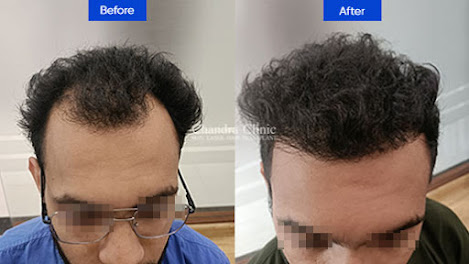Will Hair Transplant Work On Scalp With Seborrheic Dermatitis?
When an individual with seborrheic dermatitis considers getting a hair transplant, they have a number of concerns. Seborrheic dermatitis is a widespread skin condition that affects the vast majority of the world's population. It causes itchy, flaky skin, which can be found on the face or on the scalp. Those suffering from this illness are concerned. They fear whether obtaining a hair transplant while suffering from this condition will produce the desired outcomes. Many people also wonder if seborrheic dermatitis can affect the growth of a hair transplant.
Yes, a hair transplant on a scalp with seborrheic dermatitis is conceivable; the only restriction is that certain essential considerations must be followed. This blog is written to provide detailed answers to these questions. The content for this blog is compiled from the insights offered by a professional hair transplant specialist, Dr. Urvashi Chandra, who is the best hair transplant surgeon in Delhi at Chandra Clinic. Let's begin by determining whether seborrheic dermatitis can cause hair loss.
Is Hair Loss Caused by Seborrheic Dermatitis?
In general, seborrheic dermatitis does not result in hair loss. This illness, however, produces inflammation and discomfort, which can result in temporary hair loss due to scratching. Excessive scratching can harm hair follicles, slowing growth. Furthermore, this injury can cause hair follicles to enter the telogen (resting) phase too soon.
What Is the Cause of Seborrheic Dermatitis?
Seborrheic dermatitis is caused by an excess of sebum, which is an oil secreted by the sebaceous glands. The medical field has not yet discovered why this happens, but specialists assume it is linked to a hereditary predisposition or an auto-immune disorder.
DHT, the hormone present in the sebaceous glands that causes androgenic alopecia (genetic hair loss), is said to be produced through sebum as well. The removal of sebum from the scalp is a major reason why ketoconazole containing shampoos are beneficial in treating genetic hair loss.
Does Seborrheic Dermatitis Have an Impact on Hair Transplant Growth?
In a nutshell, Yes! While hair transplant surgery is minimally invasive, it might still result in slight edema and inflammation. Seborrheic dermatitis also causes redness and itching. The grafts are susceptible during the first seven days after a hair transplant process, which means that any scratching, itching, or inflammation can harm the grafts.
Considerations for Hair Transplantation on the Scalp with Seborrheic Dermatitis
Control Dermatitis: Before obtaining a hair transplant, you must first regulate and maintain your scalp health. This is vital. To get a treatment for this scalp issue, one needs to contact a hair professional.
Hair Transplant Surgeon Consultation: The degree of seborrheic dermatitis is assessed by the surgeon to determine whether a patient is a good candidate for hair transplantation. The severity of the problem, the amount of the hair loss, and the candidate's overall health will all be taken into account by the surgeon.
Medication Management: Before a hair transplant, the surgeon may offer drugs to regulate the illness. This helps to improve the condition of the scalp and prevents issues.
Post-operative Care: It is critical to follow the post-operative instructions provided by the hair transplant surgeon. To avoid infections, it is necessary to maintain the scalp clean and to take the prescribed treatments.
Tips for Controlling Seborrheic Dermatitis
Shampoo as frequently as your specialist suggests. Seborrheic dermatitis is most commonly found on the scalp. Using the medicated shampoo(s) recommended by the doctor can help avoid white flakes and dry, itchy scalp.
Use skin and hair care products that are devoid of alcohol. A flare-up might occur if a skin or hair care product contains alcohol. As a result, specialists advise using products labelled "alcohol-free." This includes any moisturizer, shaving cream, conditioner, sunscreen, or makeup you use on the skin or hair.
Reduce stress. When people's stress levels rise, they are more likely to experience flare-ups. While one cannot eliminate stress, one can find ways to manage it. Meditation, exercise, and other stress-reduction practises can be beneficial.
Cold, dry weather should be avoided. When the weather turns cold and dry, flare-ups are prevalent. Seborrheic dermatitis is frequently aggravated by dryness. Dress for the weather to avoid winter flare-ups. This involves donning a hat when going outside.
Apply sparingly if one uses hair spray, gel, or pomade. The use of these products may result in flare-ups.
Consult with a skilled skin or hair expert. A treatment plan from an expert doctor can help one control seborrheic dermatitis, prevent flare-ups, and treat flare-ups as soon as they occur.
Conclusion
Seborrheic dermatitis should not impair the success of a hair transplant treatment in general. However, if the condition continues to irritate the scalp, creating uncontrollable itching, it may result in poor growth. However, one can get the best results by controlling the condition and following proper post-operative guidelines. Altogether, before undergoing a hair transplant treatment, patients must treat seborrheic dermatitis first.
In order to get an effective hair transplant or to seek guidance on any of the concerns related to it, one can consult Dr. Urvashi Chandra at Chandra Clinic, a renowned hair transplant clinic in Delhi.
The expert surgeon specializes in hair transplant using sophisticated techniques such as FUT, FUE, and her signature technique, BIO-IPT. The appropriate procedure is suggested based on the patient's needs, baldness stage, hair type, and a variety of other considerations.
To know more visit her now!




Comments
Post a Comment